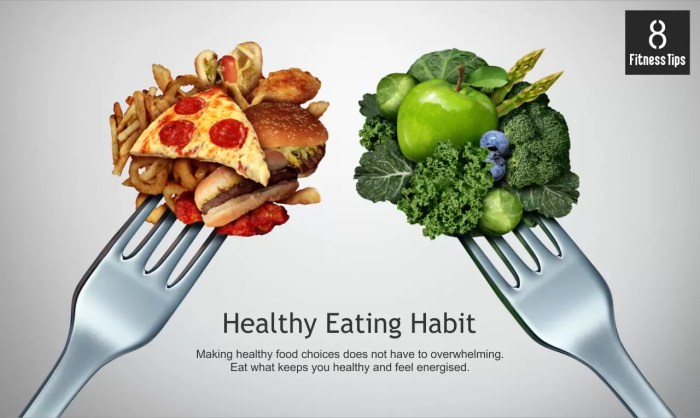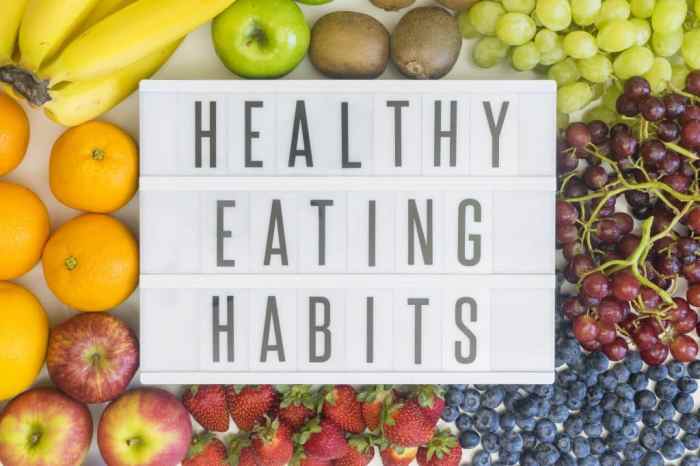Healthy Eating Habits: Fueling Your Body Right sets the stage for a journey into the world of nutrition, wellness, and vitality. Exploring the importance of nourishing your body with the right foods can lead to a life filled with energy, clarity, and overall well-being.
Let’s dive into the key components of a healthy diet, tips for developing sustainable eating habits, and the art of meal planning and preparation for a healthier lifestyle.
Importance of Healthy Eating Habits
Eating right isn’t just about fitting into those skinny jeans, it’s about feeling good from the inside out. Healthy eating habits play a crucial role in overall well-being, impacting everything from energy levels to mental clarity.
Prevention of Chronic Diseases
Healthy eating habits can be a game-changer when it comes to preventing chronic diseases like heart disease, diabetes, and certain types of cancer. By fueling your body with nutrient-rich foods, you can lower your risk of developing these serious health conditions.
Improved Energy Levels and Mental Clarity
When you ditch the junk food and opt for nutritious meals, you’ll notice a significant boost in your energy levels. Your brain will thank you too, as healthy eating habits have been linked to improved mental clarity and focus. Say goodbye to those midday crashes and brain fog!
Components of a Healthy Diet

Eating a balanced diet is crucial for maintaining good health and overall well-being. This includes incorporating essential food groups, practicing portion control, and consuming a variety of nutrient-dense foods.
Essential Food Groups, Healthy Eating Habits
- Fruits and Vegetables: Rich in vitamins, minerals, and fiber, these foods help support overall health and reduce the risk of chronic diseases.
- Whole Grains: Provide essential nutrients and fiber, promoting digestive health and helping to regulate blood sugar levels.
- Protein Sources: Include lean meats, poultry, fish, nuts, and legumes to support muscle growth, repair, and overall body function.
- Dairy or Dairy Alternatives: Important for bone health, these foods provide calcium, vitamin D, and other essential nutrients.
Portion Control and Moderation
Maintaining portion control is key to preventing overeating and managing weight. By being mindful of serving sizes and listening to your body’s hunger cues, you can avoid consuming excess calories and maintain a healthy weight. Moderation is also important when it comes to indulging in less nutritious foods, as enjoying treats in moderation can still be a part of a healthy diet.
Variety of Nutrient-Dense Foods
Consuming a variety of foods ensures that you are getting a wide range of essential nutrients that support various bodily functions. Nutrient-dense foods, such as fruits, vegetables, whole grains, and lean proteins, provide vitamins, minerals, and antioxidants that promote optimal health and reduce the risk of nutrient deficiencies. By incorporating a diverse array of foods in your diet, you can ensure that your body is getting everything it needs to thrive.
Tips for Developing Healthy Eating Habits
Eating a balanced diet is crucial for overall well-being. Here are some tips to help you develop healthy eating habits.
Incorporating More Fruits and Vegetables
One strategy to increase your fruit and vegetable intake is to make them easily accessible. Keep pre-cut fruits and veggies in the fridge for quick snacks or add them to your meals. Experiment with different recipes to find delicious ways to incorporate more produce into your diet.
Limiting Processed Foods and Sugars
To reduce processed foods and sugars in your diet, start by reading labels and being mindful of added sugars and artificial ingredients. Cook meals at home using fresh ingredients whenever possible, and limit your intake of sugary beverages and snacks. Opt for whole foods like fruits, vegetables, whole grains, and lean proteins.
Mindful Eating Practices
Practice mindful eating by paying attention to your hunger cues and eating slowly. Chew your food thoroughly and savor each bite. Avoid distractions like screens while eating to focus on your meal. Being aware of your body’s signals can help prevent overeating and promote better digestion.
Meal Planning and Preparation

Meal planning is a crucial aspect of maintaining healthy eating habits as it helps individuals make conscious choices about their meals, ensuring they are balanced and nutritious. By planning ahead, individuals can avoid impulsive, unhealthy food choices and instead opt for meals that support their overall well-being.
Advantages of Meal Planning
- Allows for better portion control and calorie management.
- Helps in incorporating a variety of nutrients into the diet.
- Saves time and money by reducing food waste and unnecessary trips to the store.
- Reduces the stress of deciding what to eat each day.
Tips for Meal Prepping
- Set aside time each week to plan your meals and snacks.
- Prepare ingredients in advance, such as washing and chopping vegetables or marinating proteins.
- Use batch cooking to make large portions of meals that can be portioned out for the week.
- Invest in quality storage containers to keep prepped meals fresh.
Importance of Cooking at Home
Cooking at home allows individuals to have full control over the ingredients used in their meals, ensuring they are wholesome and free from excessive preservatives, added sugars, and unhealthy fats. By cooking at home, individuals can experiment with different recipes, flavors, and cooking methods to create delicious and nutritious meals that support their health and well-being.